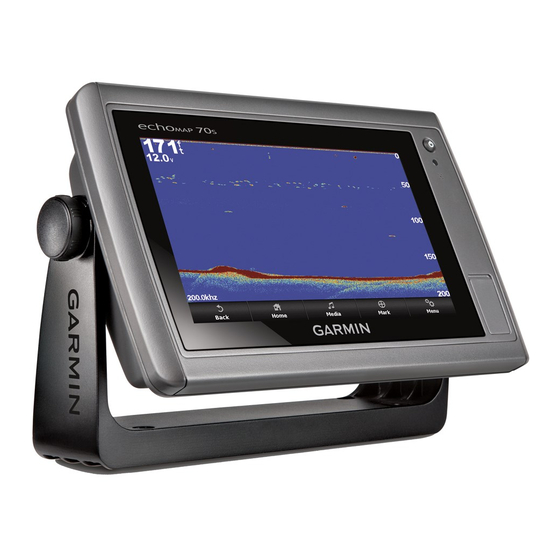Connecting the Device to a Garmin Marine
Radar
Only radar-compatible devices are capable of receiving
information from a Garmin Marine Radar. Radar-compatible
devices have a port labeled RADAR. Go to
contact your local Garmin dealer to determine the appropriate
type of radar for your needs.
1
Follow the instructions provided with your radar to correctly
install it on your boat.
2
Route the Garmin Marine Network cable from the radar to the
back of your device, away from sources of electrical
interference.
3
Connect the Garmin Marine Network cable to the RADAR
port on your device.
Additional Grounding Consideration
This consideration is applicable only to seven-inch devices.
This device should not need additional chassis grounding in
most installation situations. If you experience interference, the
grounding screw on the housing can be used to connect the
device to the water ground of the boat to help avoid the
interference.
Updating the Device Software
Before you can update the software, you must obtain a
software-update memory card or load the latest software onto a
memory card.
1
Turn on the chartplotter.
2
After the home screen appears, insert the memory card into
the card slot.
NOTE: In order for the software update instructions to
appear, the device must be fully booted before the card is
inserted.
3
Follow the on-screen instructions.
4
Wait several minutes while the software update process
completes.
The device returns to normal operation after the software
update process is complete.
5
Remove the memory card.
NOTE: If the memory card is removed before the device
restarts fully, the software update is not complete.
Specifications
Physical Specifications
Device
Specification
Five-inch
Dimensions
models
(W×H×D)
Display size (W×H) 2
Weight
www.garmin.com
Measurement
7
15
13
6
/
× 5
/
× 2
/
in. (155 ×
64
16
32
151 × 61 mm)
29
/
in. × 4 in. (74 × 101.6 mm)
32
1.72 lbs (779 g)
Device
Specification
Seven-inch
Dimensions
models
(W×H×D)
Display size (W×H) 6
Weight
or
All models
Temperature range From 5° to 131°F (from -15° to
Material
Electrical Specifications
Device
Specification
All models
Input power
Fuse
NMEA 2000 LEN
NMEA 2000 Draw
Five-inch models
Max. power usage at 10 Vdc
Typical current draw at 12 Vdc 450 mA
Max current draw at 12 Vdc
Compass-safe distance
Seven-inch models Max. power usage at 10 Vdc
Typical current draw at 12 Vdc 1.3 A
Max current draw at 12 Vdc
Compass-safe distance
NMEA 2000 PGN Information
Type
Transmit and receive 059392 ISO acknowledgment
Transmit
Receive
Measurement
1
5
9
9
/
× 5
/
× 2
16
8
58 mm)
1
11
/
in. × 3
/
64
32
2.31 lbs (1.048 kg)
55°C)
Polycarbonate plastic
PGN
Description
059904 ISO request
060928 ISO address claim
126208 NMEA: Command, request, and
acknowledge group function
126996 Product information
127250 Vessel heading
128259 Speed: Water referenced
128267 Water depth
129539 GNSS DOPs
129799 Radio frequency, mode, and power
130306 Wind data
130312 Temperature
126464 Transmit and receive PGN list group
function
127258 Magnetic Variance
129025 Position: Rapid update
129026 COG and SOG: Rapid update
129029 GNSS position data
129283 Cross track error
129284 Navigation data
129285 Navigation route and waypoint info
129540 GNSS satellites in view
127245 Rudder
127250 Vessel heading
127488 Engine parameters: Rapid update
127489 Engine parameters: Dynamic
127493 Transmission parameters: Dynamic
127498 Engine parameters: Static
127505 Fluid level
129038 AIS class A position report
129039 AIS class B position report
129040 AIS class B extended position report
/
in.(230 × 143 ×
32
in. (153 × 85 mm)
Measurement
10–32 Vdc
3 A, fast-acting
2
100 mA max.
27 W
2.7 A
450 mm (17.72 in.)
27 W
2.3 A
600 mm (23.62 in.)
5

